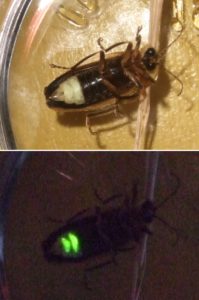Fireflies could wink out without some bright conservation ideas
June 24, 2017Some summer rituals are universal: picnics and red, ripe watermelon; afternoons in the water to beat the heat; and chasing fireflies across the lawn as they light up the night.
Yet one of those rituals is in danger of vanishing. Over the past decade, and probably much longer, fireflies have been blinking out of existence. As with many vanishing species, scientists blame a number of factors.
The largest populations of fireflies — also called lightning bugs — can usually be found in fields bordered by woods, often with a body of water in close

proximity. But as development eats up land, water becomes polluted or overrun with boaters, and humans invade their space, fireflies’ natural habitat shrinks.
Chemicals, too, undoubtedly play a role. A focus on controlling mosquitoes and other insects has led to the widespread use of pesticides, many of which aren’t species-specific.
Finding food is also becoming harder: Because larval fireflies eat the larvae of other bugs, pesticide use is decreasing their menu options. As adults, fireflies eat nectar and pollen, but like bees and butterflies, they’re also finding it harder to find food — homes with immaculately landscaped lawns and farms with herbicide-treated fields usually lack the native species that all these insects need to survive.
Scientists say light pollution is also to blame: Flashing lights confuse these bugs, because fireflies rely on their own flashing signals to communicate. And light in general — spotlights, streetlights, city lights, landscape lighting, car lights — throw them off their natural game.
Luckily, the same solutions that benefit bees and butterflies also help fireflies:
- Skip chemicals in the lawn and garden
- Plant native species of flowers
- Leave a buffer zone around waterways
- Don’t mow the grass — or at least parts of it — as low as you can go — fireflies need a place to hide during the day.
- Keep outdoor lights to a minimum, and if you must have them, keep them on a timer.
- Leave snails and slugs alone — they’re food for young fireflies
- When you do see them flitting about, don’t try to catch them: as populations drop, these little lightning bugs need all the help they can get.
Want to learn more about these amazing insects? Check out 10 Fascinating Facts About Fireflies.
Before you go, check out this amazing firefly light show from Tennessee.